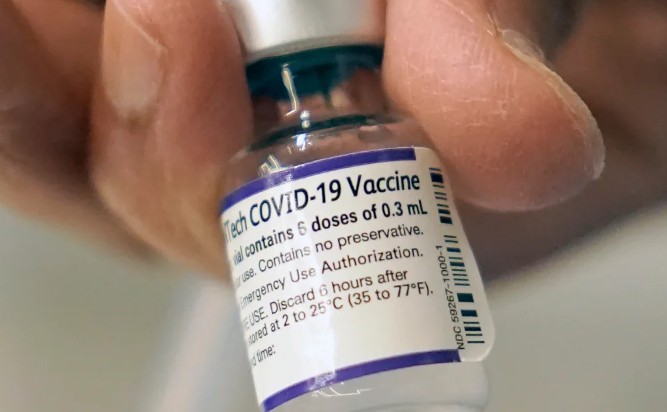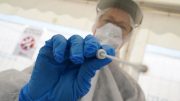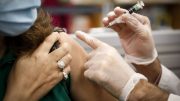The US is urging COVID-19 boosters to begin at the age of 12 to fight Omicron.
The United States is advising everyone aged 12 and up to receive a COVID-19 booster as soon as they are eligible to help fight the highly contagious omicron mutant that is sweeping the country.
Boosters were originally recommended for all 16- and 17-year-olds, but the Centers for Disease Control and Prevention authorized an extra Pfizer injection for younger teens—those aged 12 to 15—and reaffirmed its advice for 16- and 17-year-olds.
The CDC’s director, Dr Rochelle Walensky, said in a statement Wednesday night, «It is vital that we protect our children and teens from COVID-19 infection and the implications of severe disease.»
«With this booster dose, you’ll get the most protection against COVID-19 and the Omicron version.» «I advise all parents to follow the CDC’s COVID-19 immunization recommendations for their children,» she stated.
Vaccines continue to provide effective protection against serious illness caused by any kind of COVID-19, including omicron, according to specialists. The newest mutation, on the other hand, can get beyond a layer of vaccine protection and cause milder infections. According to studies, a booster dosage boosts virus-fighting antibodies to levels that give the best chance of avoiding symptomatic infection, even from omicron.
The CDC’s independent scientific experts debated whether a booster should be an option for younger teens, who are less likely to get sick with COVID-19 than adults or should be strongly recommended.
Dr Sarah Long of Drexel University, a CDC expert, advised that giving teens a booster for a transient boost in virus protection is like playing whack-a-mole. The extra dose, she added, was worth it to help drive back the omicron mutant and protect youngsters from missing school and other issues that come with even a minor case of COVID-19.
More importantly, the impact «is utterly shattering» if a child with a mild virus passes it to a more fragile parent or grandparent, who eventually dies, according to panellist Dr Camille Kotton of Massachusetts General Hospital.
Dr Jamie Loehr of Cayuga Family Medicine in Ithaca, New York, concurred, «Let’s smack this one down.»
For American children of any age, the vaccination developed by Pfizer and its partner BioNTech is the only alternative. According to the CDC, nearly 13.5 million children aged 12 to 17 had received two Pfizer vaccines, which is somewhat more than half of that age group. Last month, boosters were made available to 16 and 17-year-olds.
Following Wednesday’s ruling, around 5 million younger kids who received their last vaccine in the spring will be eligible for a booster dose right soon. According to new US guidelines, anyone who has had two Pfizer immunizations and is due for a booster can get it five months after their last injection instead of the six months previously suggested.
However, one committee member, Vanderbilt University’s Dr Helen Keipp Talbot, was concerned that such a strong recommendation for teen boosters might divert attention away from getting vaccines into the hands of children who had not been vaccinated at all.
The experts reviewed data from the United States, which showed that symptomatic COVID-19 cases and hospitalizations are seven to eleven times greater in unvaccinated adolescents than in vaccinated adolescents.
While children are less likely than adults to become very ill from COVID-19, kid hospitalizations are on the rise during the omicron wave, with the vast majority of them unvaccinated.
Dr Julie Boom of Texas Children’s Hospital said a booster recommendation for younger kids «cannot come fast enough» during the public comment portion of Wednesday’s conference.
A rare adverse effect called myocarditis, a form of heart inflammation observed predominantly in younger males and teen boys who get either the Pfizer or Moderna vaccines are the main safety concern for teenagers. The vast majority of cases are modest — significantly milder than the cardiac inflammation caused by COVID-19 — and they appear to peak in older teenagers, particularly those aged 16 and 17.
Based on data from 6,300 12- to 15-year-olds in Israel who had a Pfizer booster five months after their second dose, the FDA judged that a booster dose was equally safe for younger teens as it was for older teens. Officials in Israel stated Wednesday that after providing 40,000 additional boosters to this age range, they’ve seen two cases of mild myocarditis.
Dr Peter Marks, the FDA’s vaccine chief, stated earlier this week that the side effect happens in roughly 1 in 10,000 men and boys aged 16 to 30 years old after their second vaccination. However, he claims that a third dose is about a third less hazardous than the first two, owing to the fact that more time has gone between the booster and the first two shots.






Be the first to comment on "The US is urging COVID-19 boosters to begin at the age of 12…"